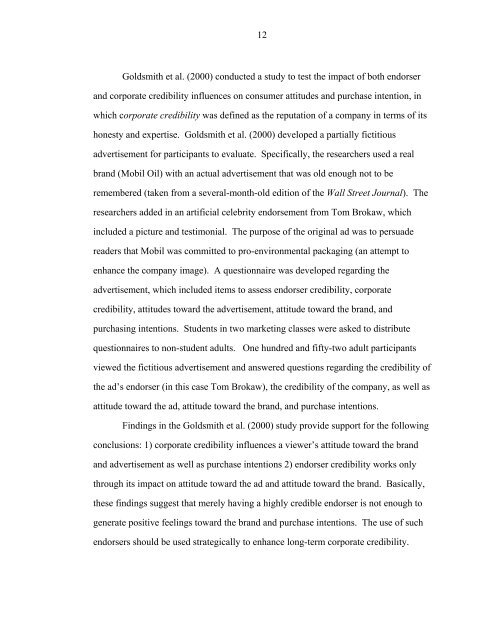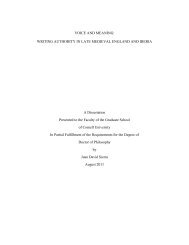Briana Anderson - Cornell University
Briana Anderson - Cornell University
Briana Anderson - Cornell University
You also want an ePaper? Increase the reach of your titles
YUMPU automatically turns print PDFs into web optimized ePapers that Google loves.
12<br />
Goldsmith et al. (2000) conducted a study to test the impact of both endorser<br />
and corporate credibility influences on consumer attitudes and purchase intention, in<br />
which corporate credibility was defined as the reputation of a company in terms of its<br />
honesty and expertise. Goldsmith et al. (2000) developed a partially fictitious<br />
advertisement for participants to evaluate. Specifically, the researchers used a real<br />
brand (Mobil Oil) with an actual advertisement that was old enough not to be<br />
remembered (taken from a several-month-old edition of the Wall Street Journal). The<br />
researchers added in an artificial celebrity endorsement from Tom Brokaw, which<br />
included a picture and testimonial. The purpose of the original ad was to persuade<br />
readers that Mobil was committed to pro-environmental packaging (an attempt to<br />
enhance the company image). A questionnaire was developed regarding the<br />
advertisement, which included items to assess endorser credibility, corporate<br />
credibility, attitudes toward the advertisement, attitude toward the brand, and<br />
purchasing intentions. Students in two marketing classes were asked to distribute<br />
questionnaires to non-student adults. One hundred and fifty-two adult participants<br />
viewed the fictitious advertisement and answered questions regarding the credibility of<br />
the ad’s endorser (in this case Tom Brokaw), the credibility of the company, as well as<br />
attitude toward the ad, attitude toward the brand, and purchase intentions.<br />
Findings in the Goldsmith et al. (2000) study provide support for the following<br />
conclusions: 1) corporate credibility influences a viewer’s attitude toward the brand<br />
and advertisement as well as purchase intentions 2) endorser credibility works only<br />
through its impact on attitude toward the ad and attitude toward the brand. Basically,<br />
these findings suggest that merely having a highly credible endorser is not enough to<br />
generate positive feelings toward the brand and purchase intentions. The use of such<br />
endorsers should be used strategically to enhance long-term corporate credibility.

















